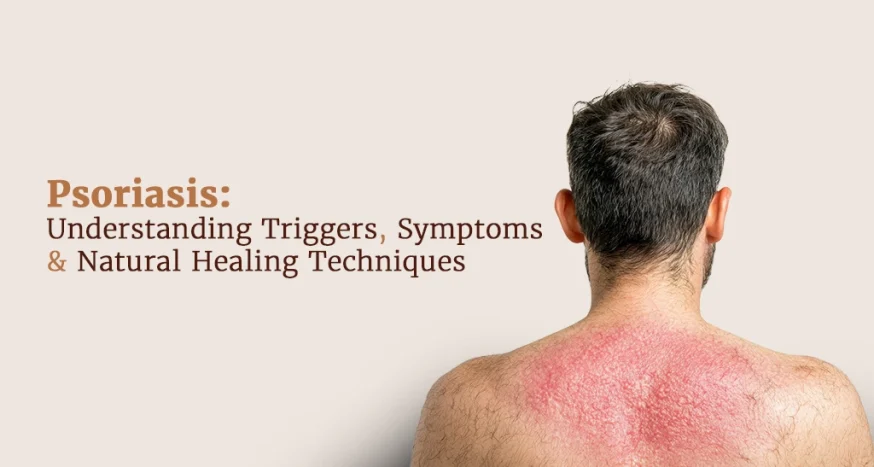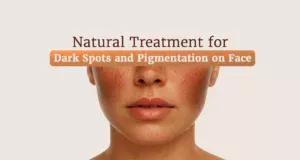Psoriasis is a non-contagious, chronic autoimmune skin condition. It causes the rapid buildup of skin cells, leading to thick, red patches covered with silvery scales. While it can flare up at any time, psoriasis affects over 125 million people worldwide and is often confused with other skin conditions like eczema due to similar symptoms.
In this article, we’ll explore the triggers, symptoms, and a holistic approach to managing psoriasis from an Ayurvedic perspective.
Common Psoriasis Triggers and Symptoms
Psoriasis is not just a skin deep issue; it’s an immune system problem that manifests on the skin. Flare-ups can be triggered by a variety of factors, including:
- Infections: Infections, especially strep throat, can trigger a form of psoriasis known as guttate psoriasis.
- Skin Injury: Any trauma to the skin, such as cuts, scrapes, sunburns, or insect bites, can cause a new patch of psoriasis to form at that site.
- Stress: High levels of emotional and physical stress can weaken the immune system and lead to a flare-up.
- Medications: Certain drugs, including lithium, beta-blockers, and antimalarial drugs, are known to trigger or worsen psoriasis.
- Lifestyle: Factors like obesity, excessive alcohol consumption, and smoking can increase the risk and severity of psoriasis.
- Weather: Many people find that their psoriasis gets worse in cold, dry weather and improves with sunlight exposure.
The symptoms of psoriasis vary depending on the type and can include:
- Thick, red patches of skin with silvery-white scales.
- Dry, cracked skin that may bleed or itch.
- Pitting, discoloration, or crumbling of fingernails and toenails.
- Stiffness, swelling, and pain in joints (a condition known as psoriatic arthritis).
- Flaky, red patches on the scalp that can look like severe dandruff.
The Ayurvedic Viewpoint on Psoriasis
In Ayurveda, psoriasis is seen as a deeper imbalance within the body, primarily related to the doshas, or mind-body energies: Vata, Pitta, and Kapha. An imbalance, often caused by poor digestion and the accumulation of toxins (ama), is believed to be the root cause of the condition.
- Vata imbalance contributes to the dryness, flaking, and severe itching associated with psoriasis.
- Pitta imbalance is responsible for the inflammation, redness, and burning sensation.
- Kapha imbalance leads to the thickening and scaling of the skin.
Ayurveda aims to manage psoriasis by addressing these imbalances through a holistic approach.
Natural Healing Techniques in Ayurveda
Ayurvedic treatment for psoriasis is comprehensive, combining dietary changes, lifestyle modifications, and herbal therapies to cleanse the body and restore balance.
1. Panchakarma Therapy
Panchakarma, a series of five cleansing therapies, is often recommended to eliminate toxins.
- Vamana (Therapeutic Vomiting): This therapy is used to remove excess Kapha from the stomach and lungs, which helps improve digestion and clear the skin.
- Virechana (Therapeutic Purgation): This helps cleanse the liver, gallbladder, and small intestine of excess Pitta, which reduces inflammation and redness.
- Basti (Medicated Enema): This therapy targets the colon, where Vata is most active, helping to regulate digestion and reduce dryness.
2. Supportive Herbal Formulations
Ayurvedic herbs are used both internally and externally to manage symptoms and support healing.
- Neem: A powerful herb with anti-inflammatory and antibacterial properties, Neem helps soothe irritated skin and reduce redness.
- Turmeric: Known for its active compound, curcumin, turmeric is a potent anti-inflammatory that helps reduce irritation and supports overall skin health.
- Khadira: This herb is traditionally used to purify the blood and eliminate toxins, which is essential for managing skin conditions.
- Sariva and Manjistha: These herbs are highly valued in Ayurveda for their blood-purifying properties and are often used in formulations for chronic skin issues.
3. Dietary and Lifestyle Adjustments
Ayurveda emphasizes a disciplined diet and lifestyle to manage psoriasis flare-ups.
- Diet: Avoid foods that can aggravate the doshas, such as spicy, sour, salty, and fermented foods. Instead, focus on a diet rich in bitter and astringent foods and ensure you’re drinking plenty of water.
- Stress Management: Incorporate daily practices like meditation and yoga to reduce stress, a key trigger for psoriasis.
- Topical Care: Use herbal oils or pastes containing Neem or Coconut to moisturize the skin and soothe inflammation.
Psoriasis is a persistent condition that requires a long-term management strategy. While Western medicine offers effective treatments, Ayurveda provides a complementary, holistic approach. By focusing on cleansing the body, balancing the doshas, and adopting a healthy lifestyle, it’s possible to manage flare-ups and improve your quality of life. Always consult with a qualified healthcare provider or Ayurvedic practitioner before beginning any new treatment.





